Las Vegas Shooter Stephen Paddock Had Been on Gambling Losing Streak Prior to Attack, MGM CEO Jim Murren Speaks Out
Posted on: November 3, 2017, 09:30h.
Last updated on: November 4, 2017, 02:58h.
Stephen Paddock had seen his net worth decrease substantially in the two years prior to the Las Vegas Mandalay Bay shooting on October 1, according to the latest information from Clark County Sheriff Joe Lombardo.
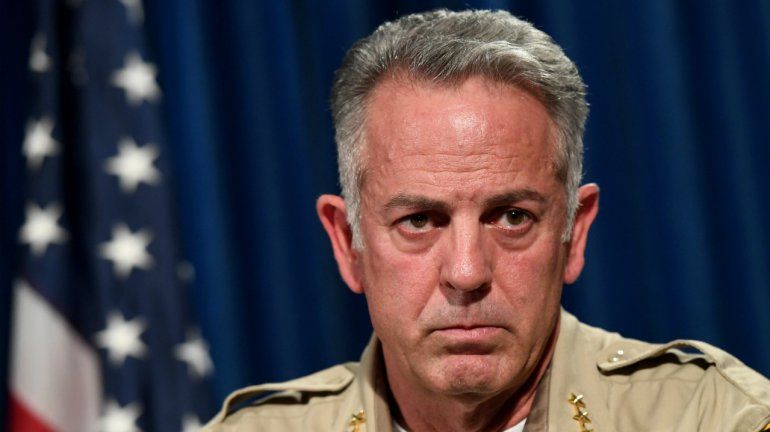
The man who killed 58 country music fans below his 32nd floor suite had seen losses from his excessive gambling on the Strip and throughout Nevada, as well as in his real estate deals and holdings, according to the sheriff.
During an interview this week with KLAS-TV Channel 8 in Las Vegas, Lombardo explained that Paddock had had some success in the real estate market throughout his life, and was also a certified public accountant. But his prolific gambling throughout the last few years was taking its toll, the sheriff added.
The saying goes that “the house always wins,” and since September 2015, that was apparently the case more times than not for Paddock.
“Over time, he’s gone up and down in his wealth associated with gambling. But since September of 2015, he’s lost a significant amount of [that] wealth, and I think that may have been a determining factor on what he [did],” Lombardo revealed in the interview.
Missing Motive: Gambling?
Though law enforcement continues to uncover more about Paddock’s history by the day, the sheriff admits there is still no clear motive for what happened a month ago. Lombardo explained that Paddock wasn’t on any law enforcement radar, not on the federal or local level, and had only two traffic citations on his record.
Lombardo said that to date, FBI profilers have determined Paddock likely had a narcissistic personality, one that was “status-driven.”
“He liked to be recognized in the casino environment … So obviously that was starting to decline in the short period of time and that may have had a determining effect on why decided to do what he did,” Lombardo opined, although why the specific non-gaming target and the lengthy and detailed months of planning have still not been explained in any way.
Paddock routinely gambled hundreds of thousands of dollars each year, but in Las Vegas that still might not lend one to being deemed a “whale” or the highest of the high rollers. “I don’t know in the casino environment whether he was considered a big gambler. I think in his own mind he believed himself to be. But he was going in the wrong direction,” Paddock concluded.
MGM Issues Video
Gaming and tourism analysts don’t believe Paddock’s shooting will have a long-term impact on the industries in Las Vegas. Casino operators want to make sure that’s true, however.
This week, Mandalay Bay parent MGM Resorts issued a statement about the future of city. CEO Jim Murren has largely stayed behind the scenes over the last month, save for one public appearance, but this week he took to social media to express MGM’s vision as “we begin to look forward and heal.”
“In the face of unspeakable violence, ordinary men and women stepped up, took action, and saved lives. I’m proud to say that many of those were MGM Resorts employees,” Murren via video.
Looking to the future, Murren stated, “We remain committed to providing some of the most memorable entertainment experiences that can be found in this city, or any other. Thank you for your patronage, and your prayers. We look forward to seeing you soon.”
Just over two weeks ago, MGM brought in PR firm Joele Frank, Wilkinson Brimmer Katcher, a New York-based agency specializing in crisis communications, to guide the company through the best ways to come back from the tragedy. The gaming operator also canned its Welcome to the Show video, which had been unveiled only weeks before, with its already controversial “We’re in the Holy Sh*t” business line, which took on a whole new, and much more ominous, meaning after the shootings.
Related News Articles
Galaxy Gaming Back in Nevada’s Good Graces Without Ousted CEO Saucier at Helm
James Packer Says Crown Resorts Slot Tampering Allegations a ‘Lie’
Wynn Resorts Must Face Former Shareholder Kazuo Okada in Court, Judge Rules
Most Popular
LOST VEGAS: The Foster Brooks Robot at MGM Grand
Bally’s Sets Date for Tropicana Las Vegas Implosion & Party
Most Commented
-
VEGAS MYTHS RE-BUSTED: You Don’t Have to Pay Resort Fees
— August 2, 2024 — 16 Comments -
VEGAS MYTHS RE-BUSTED: Elvis Was a Straight-Up Racist
— August 9, 2024 — 11 Comments -
ANTI-SOCIAL BEHAVIOR: Vegas Casino Buffet Stunt in Poor Taste Goes Viral
— August 16, 2024 — 7 Comments -
VEGAS MYTHS RE-BUSTED: The Strip Tried Appealing to Families and Failed
— August 23, 2024 — 7 Comments
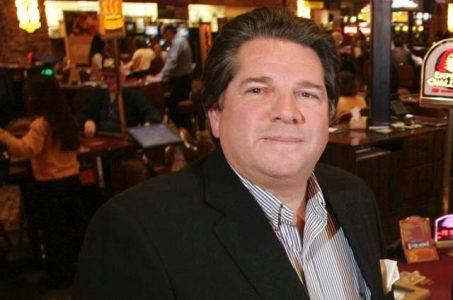
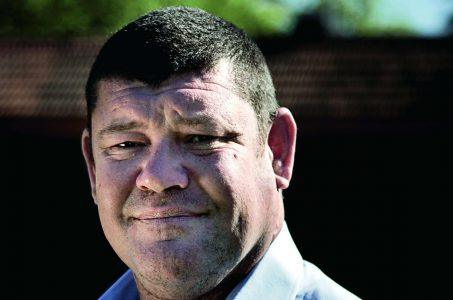
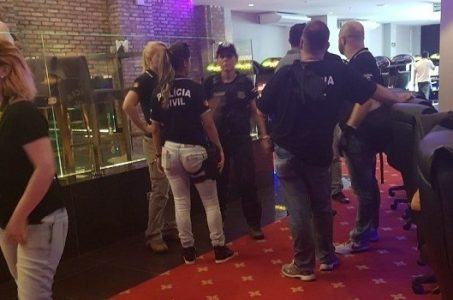
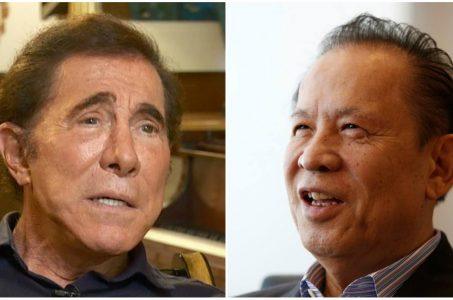












Last Comments ( 2 )
Why on earth would law enforcement or FBI wipe clean or purposefully destroy evidence on all concert patrons private cell phones that they found? That was for their memory of the country music concert? Why erase their private records of their concert event? They paid to be there. Legally can they? But, more importantly why would they? Some may have even had the last photos taken of their loved one before they died. Why would someone ever take away those memories? Seems odd ... for the lone wolf shooter theory. Now, if specific patrons requested that they do that free of service then that would be completely understandable. But, many complained that too much information was destroyed or lost without giving anyone permission to do so. *But, good no one could profit off of the tragedy. (I'm rather shocked if cell phones were going to be collected and evidence destroyed or hidden ... that no one has hidden the video "Las Vegas Shooting Bus Stop" video. That video is telling .... it's the only one that may contradict lone gun man. Two hand gun shots heard that have never been explained to the public. Not even attempted .... or out and out lying. Not even disclosed if Paddock was found with one or possibly two gun wounds - much less where or how. Sure, there are logical possibilities ... but, why not say how it was possible with what was found at the scene?) Is this why persons living in high crime areas eventually become 'silent' with police? Afraid to be involved or open up to what they know? Have seen? Have heard? Because nothing ever adds up? Thus, why put themselves out there. (The risk ... their safety ... too high if crime not solved?) Maybe. Prayers to all the family members and loved ones of the victims (and those injured). May you some day find peace and understanding of the event that unfolded that took your loved one away forever.
From mild, humble recluse who had or made millions but, didn't car about money - wasn't flashy to narcissistic downward spilling (loosing) gambler? Ugh .... with so much FAKE News which one is more accurate? Was he even in debt? He had multiple paid off homes per the media worth hundreds of thousands that he was too old to even enjoy (or really visit) ... and allegedly (he) sent/wired/transferred 127K to Marylou. A long way off from being the 'crazed gambling looser' .... by most standards. (Still able to pay a prostitute 6K ... (when he had a girlfriend)? And, paying for room service/food with allegedly only one person inside his room? (Allegedly, hotel witnesses say not true about only one person in the room.) He doesn't seem 'too worried' about finances. But, who knows ... without knowing him personally? And, regardless of how much he 'told' people he gambled ("million per day") if in reality he only gambled hundreds of thousands a year ... he was no where near the end of his gambling days or going broke. And, at HIS AGE could have easily kept up this pace of gambling until the day he died .... technically speaking ... with the assets he had (owned). Thus, if having a little bit of a dry spell at gambling (with these sorts of assets) narcissism might need to be considered for sure. To push someone to that degree of madness. Does that fit in line with a year (if not two) of planning .... while also continuing to gamble and lead from what everyone can see a rather 'normal' life ... with nothing (like this) on his mind? Because I've never known a psychopathic homicidal person much less a psychopathic homicidal suicidal person ... have to leave this at the psychiatrists and FBI and law enforcements door steps. Note to Self: Remind me to never visit Las Vegas. (Jesus!) No wonder so slow to be forthcoming to the public .... $$$$$ .... apparently over rides public safety. But, really either way public safety was an issue .... lone wolf or not. So, did police shoot innocent (concert) spectators on roof tops who ran away from people chasing them with guns? Who were police shooting that night? Do those first few sniper shots by the fence; from the outside in, near the cops lining the wall line up with the Mandalay Bay hotel shooter? It looked like Mandalay Bay hotel was straight ahead ... in front of them. Bullets can curve 180 degrees when fired? Can an expert explain all the shots heard (and videos taken). To show once and for all one shooter. It would help ease the minds of the public. If the alleged shots from helicopters were doctored or photo shopped or not even helicopters filmed from that location that night .... there are many other more questionable videos that need to be examined but, more importantly explained using math and logic and location(s). Different locations from different angles can absolutely be 'tricky' to determine coming from where? And, the taxi driver appears to be (sounds to be) right under a shooter .... and she drives away coming closer and closer to Mandalay Bay hotel .... the shooting (noise) becomes more and more faint or muffled. How is that possible - to drive away BUT, closer to the alleged shooter ... and the noise level drops off? But, it appears the patrons are running in the opposite direction of her driving ... and towards where the gunshots were loudest (where she had previously been)? Never mind why is the new Jesus Campos so afraid to talk or speak. Why did Ellen have to remind him - guide him - through what happened to him? Could he not remember ... or was he simply not there. What happened to his memory? This was a traumatizing event ... he should have ZERO problem remembering what happened. (Like a camera or movie that won't quit. And, it didn't appear to be a language barrier that was preventing him from 'talking'.) In the heat of the moment and soon there after (and currently) more focus has been placed on before 10:15pm than after 10:15pm? Why? For public safety that was backwards? (He's dead.) Any possible legal issues should be second to what really happened. Who was involved? Why? And, could this happen again? And, there arguing over when did police first arrive? Why? (I mean we know why ... money and legal issues.) But, why? .... Why was public safety being completely ignored ... especially, when so many patrons were eventually claiming or saying 'multiple shooter'. Especially, when Intelligence and FBI know there are racists hate groups or extremists out there that claim events such as this will happen? And, have been saying this for a very long time. What's to say they wouldn't take 10 months to plan such an event? They've been talking about it for at least 6 years. And, probably much longer by the details revealed. Ten months would be nothing. (And, an alleged hotel reservation in Chicago would have been nothing to pull off ... for this group.) If FBI are trying to say ... not them .... then (great). Carry on. Resume business as usual. (Note: they talked about killing cops for years .... before it actually happened. So, yes 10 months ... especially, when it became obvious Trump was more than likely going to win the presidential elections would have probably been nothing - if truth be told.) Are you positive Paddock or his brother was unknown to this racist hate group .... Paddock lived in Viera, Florida (where the hate group likely may have been at the time he was a resident) and Paddock had some strange connection to Obama's contractor? Truth is stranger than fiction. When did Paddock sell his plane to Obama's contractor? How much? Who really is Paddock? Why would he ever need a private plane much less two? Why did he have a pilots license? Did he know how to fly? Did he ever fly? For what purpose? If his brother didn't know ... was it because he was working for the government or just part of his personality? Could Paddock have retired from 'what ever'? And, recently settled down with a girlfriend? How does a woman that age (with a great job) quit her job and trust that someone will ... for lack of a better word .... take care of her? They weren't married. Were they engaged? With as much as he allegedly liked to gamble .... why wouldn't she just continue to work in the casinos? Did she have a different job ... a different source of income? But, then again if she never realized he was a narcissist (and a liar) she may have never thought twice about quitting her job at the casino. At least that part sort of fits. He could have been secretive about his finances (or lack there of) with her. She may have thought everything was fine until FBI told her otherwise.